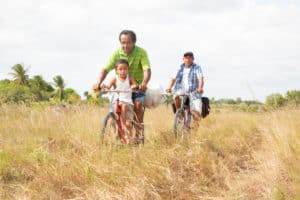Several years after the Wapishana people of Guyana, South America, received their New Testament, the translation continues to touch lives as they increasingly engage with it.
In many villages, there is not just one New Testament in each home. Instead, everyone in the household family treasures their own individual copy, says Bev Dawson, a Wycliffe worker now retired from serving among the Wapishana. She was updated recently by Wapishana mother-tongue translator Olive Williams, who credits the prayers of North American Christians for the impact the Scriptures have had.

Jerry (with grandson) and Juram Brown served as father-and-son translators for the Wapishana New Testament. (Photo by Natasha Ramirez)
At a place called Dadanawa Ranch, a group of more than 16 regularly gather to listen and follow along in their New Testaments as the Scriptures are shared on a Proclaimer audio player. A visitor on a fishing trip stopped at one of the ranch’s outstations, where he found all the cowboys and their wives resting in the bunkhouse. They invited him in with their normal Wapishana greeting; “Welcome, come and join us eating.” But they added something: “Welcome, come and join us eating God’s Word.” They were in their hammocks listening to a Proclaimer.
The machine is used in many Wapishana congregations so that the Scriptures are well read and clear during church services. One man said the mother-tongue Scriptures “shocked” his heart.
Olive reports that accessibility to their mother-tongue Scriptures is changing lives among the Wapishana. Many who formerly resisted being told the gospel only wanted a surface religion. Now that they are finally understanding what God’s Word says, they are asking for more Bible teaching. Most are Catholics, who heard only English Scripture read every week in church.
The finished Wapishana New Testament arrived in 2013, despite a tragedy in the project when Wycliffe’s Richard and Charlene Hicks were earlier killed by would-be thieves
(see Word Alive, January 2014).

